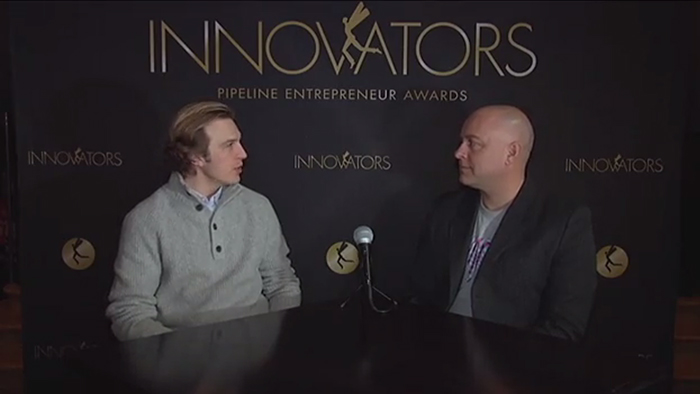Enter your email below to watch the interview
Clayton Chapman, founder of online store Provisions and chef/owner of The Grey Plume in Omaha, sat down with Brian Lee from SPN to talk about his business and experience at the Pipeline Entrepreneur Innovators Awards .
Chapman just completed his year in Pipeline and delivered his pitch for Provisions. Provisions is an artisan grocer that partners with regional sustainable farmers to manufacture things like hand-crafted charcuterie, coffee and jams for a national marketplace.
How Provisions works
Provisions opened in fall of 2014 with a store in Omaha across the street from The Grey Plume and has seen continued growth ever since then. The produce and other items are produced by region, but most of them come from Nebraska and surrounding states.
“Our driving force in our sales are our charcuterie programs, so our cured meats,” explained Chapman. “At this point everything is pork based and comes from Iowa from a series of co-op farms that all partner together to produce enough [to] keep up with market demand.”
Chapman says that customers can purchase a few items at a time for themselves or a friend, or soon they’ll be able to subscribe to items. Chapman said a monthly subscription service is in the works.
“Right now we have a partnership with The Carnivore Club. It’s an online monthly based charcuterie program,” said Chapman. “We’re releasing ours in April.”
Growth through Pipeline
Chapman said the growth he’s undergone in Pipeline has been exponential and he’s excited about the lifelong benefits that will come out of it.
“It’s been amazing, eye-opening, humbling, encouraging, engaging,” said Chapman. “I feel very fortunate to have been here and I’m excited to have gone through everything.”
According to Chapman, Provisions has changed dramatically through the year.
“[Pipeline] really allows you to look at the big picture perspective and it’s really taught me to work on our company rather than in it,” he said. “The balance between micro and macro, that’s one small detail that it’s done for me.”
A year ago he didn’t really know what he’d gotten himself into. He had an expectation that the fellowship would help him focus on his business but he wasn’t expecting the level of growth and connections that he ended up receiving.
“Sometimes you don’t really know what you don’t know until you learn that you don’t know it,” said Chapman.
A year later, Chapman feels like he’s a stronger and more capable leader and is able to make better decisions for the company and the people in it.
“I have the ability to see the market in a different way and generally run the business in a better light.”
What’s next for Provisions?
The Grey Plume has become a cornerstone in the Omaha food scene and Chapman thinks that the restaurant will always maintain that importance, but 2017 is the year to really focus on Provisions online. He hopes to move Provisions into a retail market in 2018.
Provisions is small and mighty with a team of 8 doing production, inbound and outbound sales and business management. Chapman would like to add 3 more people to the production team.
“We do handle all the inbound sales internally so when you make a purchase online we fill it and direct ship it from our location in Omaha.”
Working through the challenges
Chapman says one of the biggest challenges he’s faced so far is forecasting supply and demand and having enough product on hand as the company adds accounts.
“Our life-cycle of product is pretty long, charcuterie takes a long time to cure,” explained Chapman.
He said the product comes in the door, takes a week to manufacture, spends 12 weeks hanging, 2 weeks in stabilization and then moves to packaging.
“You’re 90 days in at this point before you’ve even sold anything,” said Chapman. “Then you have your sales cycle.”
Given the cycle, there’s risk for growing too fast.
“The only thing worse than failure in the food business is instant success because you lose the ability [to maintain] quality control and you over commit,” said Chapman. “Once we start with an account we don’t ever want to have to run into the problem of running out of product.”
Knowing people and industry
Knowing what he knows, Chapman certainly has advice for people looking to enter the food and online sales industries which is always in a state of change.
“I would say to surround yourself with like-minded, supportive people,” said Chapman. “You need to know your industry.”
He also has one more piece of advice that spawned from his years spent the business and his year in Pipeline: find a mentor.
“There [are] some powerful messages in mentorship.”




